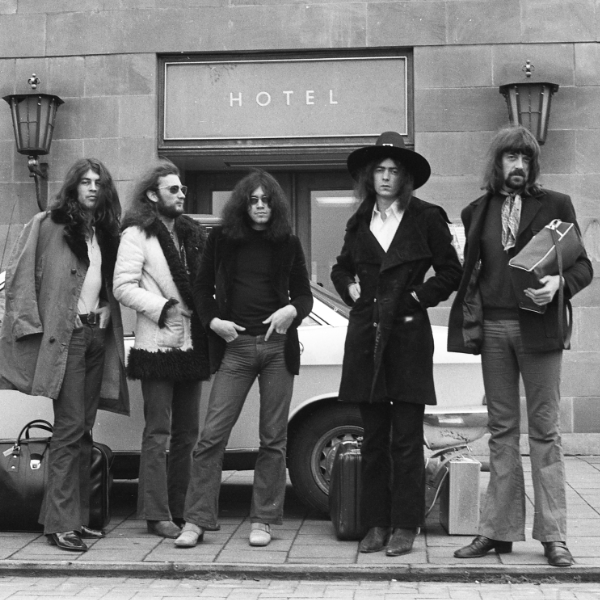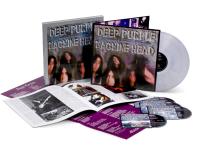Deep Purple’s Seminal, Hard-Rocking Proto-Metal Classic 1972 LP, Machine Head, Absolutely Smokes in Its New 50th Anniversary Box Set Configuration, Especially on Vinyl as Remixed by Dweezil Zappa
In these 21st century times, there is arguably no better person more ideal to helm a 50th Anniversary remix of Deep Purple’s seminal March 1972 hard-rock classic LP Machine Head than Dweezil Zappa. As a respected master guitarist himself who studied with and worshiped at the altar of the late, great Eddie Van Halen, Dweezil is more than well-versed in the nuances of hard rock and metal. Not only is he a Deep Purple fan, but he’s even performed with them at the Montreux Jazz Festival in July 2016 — a full-circle moment that should not be overlooked, considering that he is, of course, the eldest son of Frank Zappa, the man who is namechecked in the iconic Machine Head track “Smoke on the Water,” a song that actually commemorates the tragic events that triggered its title and theme.
For those of you not in the know, “Smoke on the Water” documented Deep Purple’s experience opening for Frank Zappa and The Mothers of Invention at the Montreux Casino (also the site of the original Montreux Jazz Festival) when a deranged fan burned the venue down by setting off a flare gun inside! While the venue and all of Zappa and The Motners’ gear was lost, thankfully and amazingly, no one was hurt.
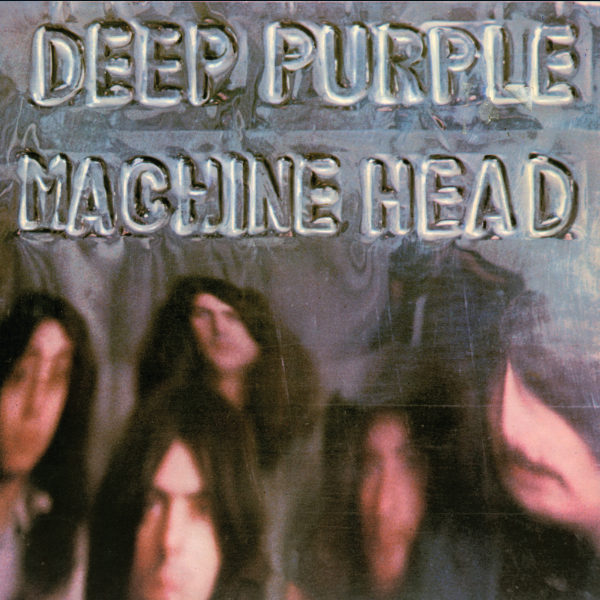
With Dweezil Zappa setting the controls, the new 50th Anniversary Machine Head remix project — which was officially released in box set form today, March 29, 2024 — aimed to “provide fresh and immersive perspectives on this classic album,” according to official press materials.
As far as this collection’s key stats go, we know from initial Rhino/Warner Records promotional materials that Dweezil was “using the original tapes” when doing his remixing. After further inquiry to Team Rhino’s PR team, we learned the original 16-channel analog master tapes were indeed ported over and remixed in a digital audio workstation (DAW) called Nuendo. The 24-bit/48kHz audio was “processed with analog outboard gear as well as digital processing for both the stereo and Atmos mixes.” (A sidenote of speculation: this hybrid A/D process may have helped Zappa to achieve the overall balance of crystal clarity and vintage warmth; more on all that in a bit.) Perhaps the most important — and coolest, frankly — detail is that all surviving members of the so-called “Mark II” version of Deep Purple who recorded the album approved the final mixes.
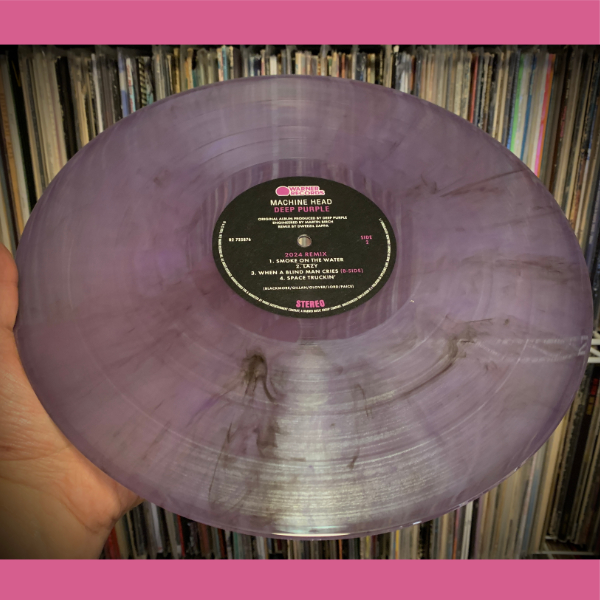
The newly remixed Machine Head LP comes pressed on appropriately titled “purple smoke” standard-weight color vinyl (as seen above). The entire box set itself was manufactured in Germany, and the vinyl is confirmed to have been pressed at the respected Optimal facilities. The SRP for this new Machine Head box set — which also includes a Blu-ray with a new Dolby Atmos mix also done by Dweezil along with the original quad mixes, and 3CDs that include new and original stereo mixes as well as previously unreleased concert recordings — is a fairly reasonable $79.99.
In the 16-page booklet’s liner notes, Dweezil shares some perspective on the Machine Head recordings, and what he learned about them along the way: “When I was recently contacted out of the blue and given the opportunity to take a ‘deep dive’ into the raw tracks recorded for Machine Head, I couldn’t have been more excited. The Machine Head multitrack recordings, in all of their 16-track, analog glory, found their way into my studio with the purpose of creating new mixes in stereo and Atmos. I was suddenly immersed in a rock and roll archeological dig of epic proportions, learning the secrets of the raw sounds on each track. For those of you who don’t know, the songs were recorded live with very few extra overdubs. A perfect example of this is ‘Space Truckin’.’ There’s a single guitar track and a single keyboard track. The huge sound of that song was the band itself, playing together in the room. Killer stuff!”
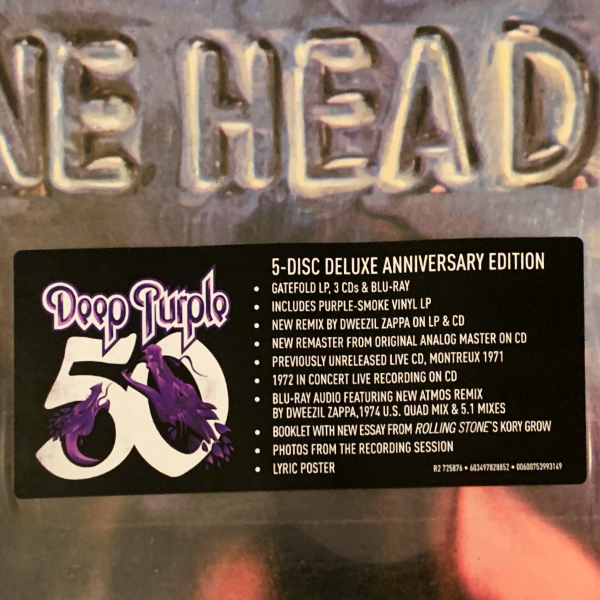
The original mix of Machine Head was an instant classic back in the day, the music of which having been recorded in a converted, unused hotel in Montreux, Switzerland that was located in the aftermath of the Montreux fire, and it was recorded with the band using/borrowing The Rolling Stones’ mobile recording truck. The album indeed delivered a distinctive, driving, hard rocking, live-feeling vibe — the sound of a well-oiled, road-tested, and fully primed band giving it their all, especially after such a near-tragic experience.
Machine Head is, in many ways, the quintessential early ’70s hard-rock album — one that’s filled with strong songs, singalong earworms, infectious hooks, headbanging ’n’ fist-pumping grooves, epic musicianship inspired by classical influences, super-appealing melodic guitar solos, and immediately identifiable incredible vocals that soar into the stratosphere.
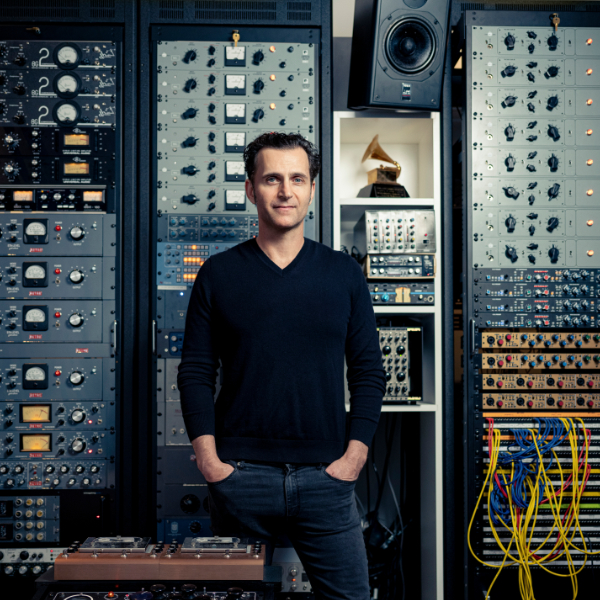
Back in the liners, Dweezil also says of Machine Head, “It’s one of those records where I think, ‘How did they come up with this?’ It’s got classical influences in the guitar and the keyboard, but then it’s got the blues and there’s little bits of funkiness. And you have this singer who has the most killer voice. All these things come together in a way where it doesn’t sound like commercial music, yet people got really excited about it. It’s a fascinating recipe.”
The original Machine Head vinyl was also a product of the times, a period when many people were not necessarily listening to their hard-rock albums on the higher-end audio equipment we all know and love today. Audiophilia, if you will, was still an emerging concept, a perspective that helps explain at least a couple of related issues.
Firstly, many of-era LPs were likely fairly compressed for smooth play on the average teenager’s audio equipment — consoles and all-in-one combo systems that were typically fitted with lower-end automatic record changers often made by companies like BSR or Garrard. Thus, delivering an album that rocked hard on inexpensive speakers but wasn’t too dynamic to the point where it would make the needle jump was probably a consideration at that time. This notion is made in reference to the (generally considered) infamous misstep made by Atlantic Records over Led Zeppelin’s October 1969 sophomore album, Led Zeppelin II, wherein they recalled Bob Ludwig’s amazing, fire-breathing, dynamic vinyl cut, instead replacing it with something far tamer (but that is another story entirely, for another time).
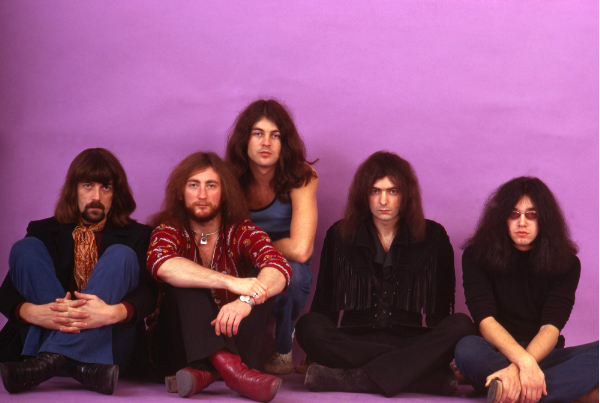
Fast-forward to the here and now, where the 20/20 hindsight reality here is that Deep Purple had an opportunity in to make the 2024 edition of Machine Head sound as good as that preferred Led Zeppelin II option in this new mix, if given the right treatment — and they went for it. While I have not yet done that direct comparison, just from an eight-mile-high perspective, Dweezil Zappa’s new mix certainly takes Machine Head much closer in that direction with a brighter high-end, richer lows, and more distinctive detailing throughout, from the audibility of Ian Gillan’s vocals to the massive distorted organ by Jon Lord and the harder-rocking drums of Ian Paice.
In short, I like the new mix a lot! It sounds like Machine Head should sound, no question, yet it is more cinemascopic. The new instrumental detailing is impressive, delivering the percussive drive of Roger Glover’s melodic Rickenbacker bass guitar lines that are locked in with Paice’s at-times funky grooves — something that’s especially notable on tracks like the aforementioned megahit “Smoke on the Water” (Side 2, Track 1). The vocal harmonies sound much stronger on this new mix.
“Highway Star” (Side 1, Track 1) kicks off the album in fine rockin’ form, with the chugging feel rightly in place yet you can also make out the flavor of the individual instruments, from Ritchie Blackmore’s overdriven electric guitars to the killer bass fills to the rock-solid, hard-hitting drumming. (Just listen for Paice’s super-precise cymbal hits and runs around the drum kit.)
There is much more detailed nuance happening throughout this Machine Head, such as Blackmore’s double-tracked guitar solo during “Highway Star” — take note of the special effects brought out in the mix toward the end. I really dig Lord’s wide-panned stereo keyboard soloing on “Never Before” (Side 1, Track 4), and Blackmore’s soloing on the opening of the boogie tune “Lazy” (Side 2, Track 2), which delivers a nice sense of amplifier tone bathed in a bit of reverb.
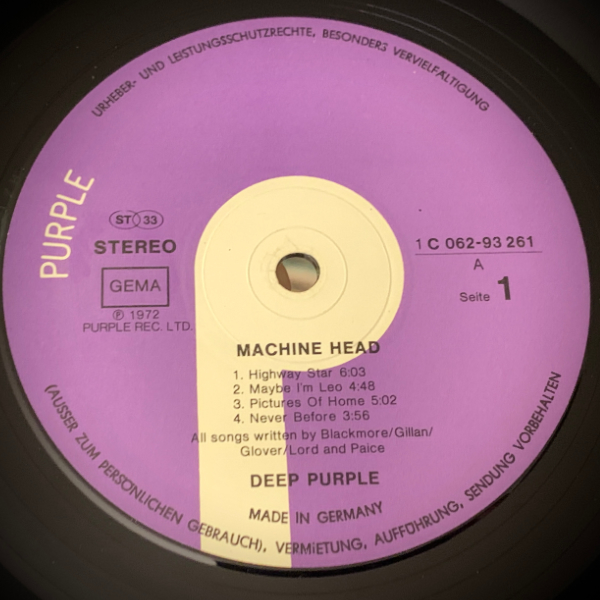
The new 50th anniversary vinyl pressing of Machine Head sounds quite excellent. The LP is well-centered and surprisingly very quiet, despite the semi-translucent color vinyl. For comparison, I also listened to my 1972-era German pressing of Machine Head, which was released on Deep Purple’s own Purple Records label. It offers great-sounding mastering and a pressing that certainly sounds better than my old, original U.S. edition on Warner Bros. (an LP I had purged some time ago, once I found the German edition). I would expect that original UK editions sound better still, but you rarely see them showing up here in the States.
Indeed, if you are looking for mint or near-mint original copies on the collector’s market, you’ll need to be prepared to spend some significant coin. Scouring Discogs, at the time of this posting, the 10 NM original U.S. copies range between $45 and $330. (Original UK pressings will likely cost you much more.)
There is likely a good reason why only 10 NM copies are listed on Discogs. (The majority are listed as VG/VG+.) If you remember what I said earlier about early ’70s mass-market audio gear being of somewhat relatively limited fidelity and quality, I can further note that most original, green-label Warner Bros. copies of Machine Head on the used market were probably played by hard-rocking teenagers who didn’t necessarily take care of their albums like we do. Especially if friends were over to, er, party, it was common to put a stack of albums on the record changer, and just let the music flow. I saw a lot of this going on back in my own junior high and high-school days. All that considered, it’s not easy to find genuinely clean, unscratched, undistorted nice-condition originals.
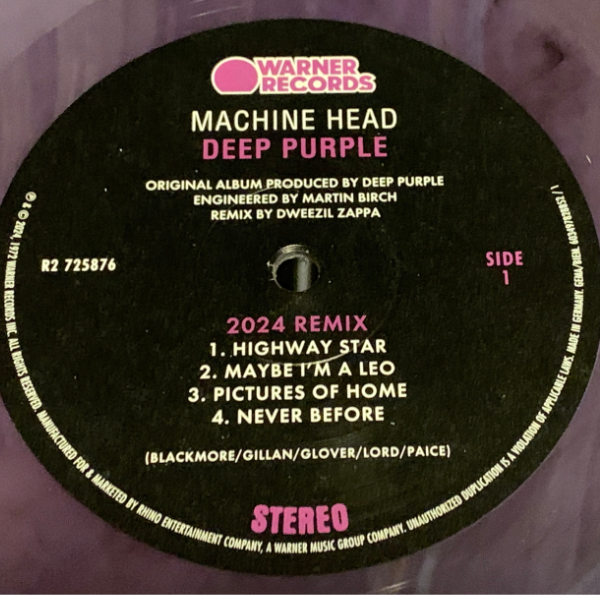
In that light, the $80 price of admission for the new Machine Head box set seems like a really good deal, especially given all the non-vinyl bonuses included. If I have any disappointments with this 50th anniversary collection, they are cosmetic details that serious collectors will understand. For one thing, it would have been nice if this set had recreated the band’s original UK and distinctive Purple Records label for the discs themselves — or at least mimic the original Warner Bros. olive-green design.
While it is novel how they flipped the gatefold sleeve design to house the 3CDs and 1BD by putting the LP storage pocket in the front left of the gatefold, the powers that be probably didn’t need to colorize the inside black-and-white photography with a purple hue. It is neat, yes, but not quite authentic to the original album design. But those are all genuinely minor nits to pick in what is overall an excellent reissue package.
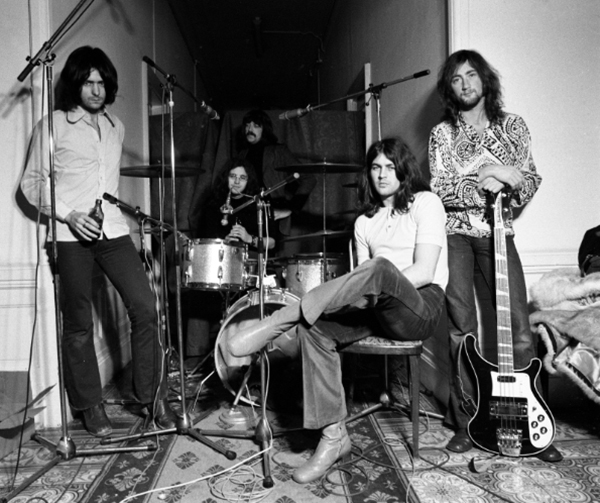
As far as our numeric rankings go, the Music on Machine Head is clearly deserving of a 10 rating from us, as it is pretty much a perfect hard-rock album start to finish. Fidelity-wise, we give the Sound a solid 9, which allows future wiggle room in the event the label issues more of an audiophile-leaning pressing on 180g vinyl and/or as a 2LP set at 45rpm and/or as a half-speed-mastered edition. As it stands, Dweezil’s mix of Machine Head here is clearly an improvement over the original mix, while also honoring the album’s original vibe and intent.
Overall, this new 50th Anniversary super deluxe edition of Deep Purple’s Machine Head is very satisfying. Budget-conscious consumers may want to hold out to see if a standalone 50th anniversary Machine Head LP will be forthcoming — but we don’t expect to see that happening anytime soon. For the serious fan, the Machine Head box set is a natural, must-have collection to pick up — so we say, get right to it!
Mark Smotroff is an avid vinyl collector who has also worked in marketing communications for decades. He has reviewed music for AudiophileReview.com, among others, and you can see more of his impressive C.V. at LinkedIn.
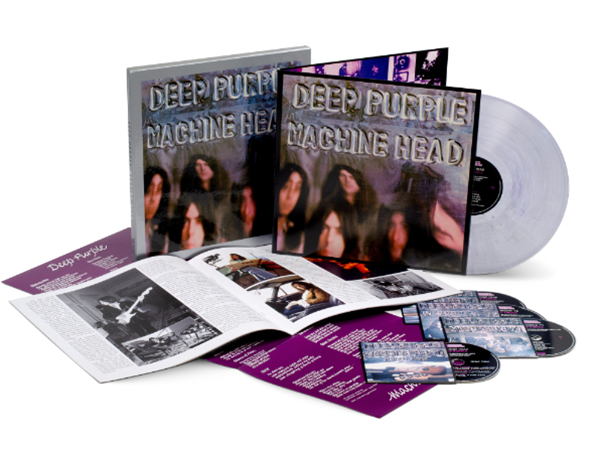
DEEP PURPLE
MACHINE HEAD
DELUXE 5-DISC 50TH ANNIVERSARY EDITION**
(Warner Records)
LP – Track Listing
Side 1
1. Highway Star
2. Maybe I’m A Leo
3. Pictures Of Home
4. Never Before
Side 2
1. Smoke On The Water
2. Lazy
3. When A Blind Man Cries (B-Side)
4. Space Truckin’
** Besides this LP, the Machine Head box set also contains 3CDs and 1BD
